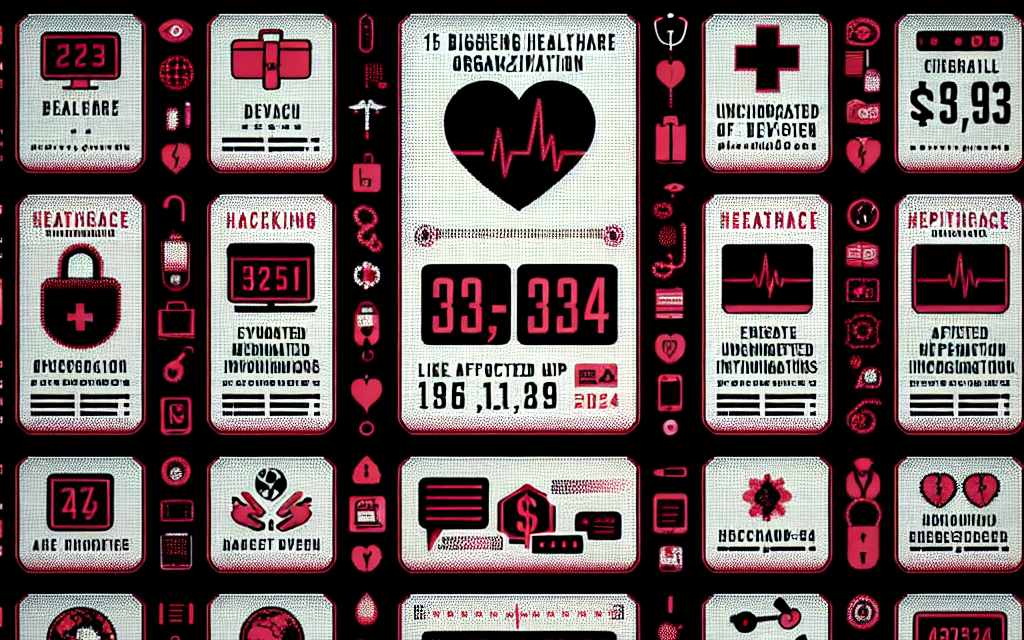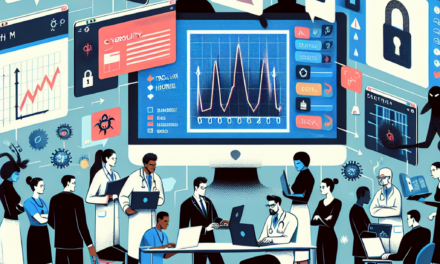The 15 Biggest Healthcare Data Breaches in the U.S. for 2024
In an era where data is considered the new oil, the healthcare sector has become a prime target for cybercriminals. The sensitive nature of health information makes it a lucrative target, and the consequences of data breaches can be devastating for both patients and healthcare organizations. As we delve into the biggest healthcare data breaches of 2024, we will explore the causes, impacts, and lessons learned from these incidents. This article will provide a comprehensive overview of the 15 most significant breaches, highlighting the importance of data security in the healthcare industry.
Understanding Healthcare Data Breaches
Before we dive into the specific breaches, it’s essential to understand what constitutes a healthcare data breach. A data breach occurs when unauthorized individuals gain access to sensitive information, which can include personal health information (PHI), financial data, and other confidential records. The healthcare sector is particularly vulnerable due to several factors:
- High Value of Data: Healthcare data is often more valuable than other types of personal information on the black market.
- Regulatory Compliance: Healthcare organizations must comply with strict regulations like HIPAA, which, if violated, can lead to severe penalties.
- Complex IT Systems: Many healthcare organizations use outdated technology, making them susceptible to cyberattacks.
- Human Error: A significant number of breaches occur due to employee negligence or lack of training.
- Increased Cyber Threats: The rise of ransomware and phishing attacks has made healthcare organizations prime targets.
With this context in mind, let’s explore the 15 biggest healthcare data breaches of 2024.
1. The Epic Health Systems Breach
In early 2024, Epic Health Systems, one of the largest electronic health record (EHR) providers in the U.S., experienced a massive data breach affecting over 3 million patients. The breach was attributed to a sophisticated phishing attack that compromised employee email accounts.
The attackers gained access to sensitive patient information, including names, Social Security numbers, and medical histories. Epic Health Systems reported the breach to the Department of Health and Human Services (HHS) and took immediate steps to secure their systems. They also offered credit monitoring services to affected patients.
This incident highlighted the vulnerabilities associated with third-party vendors in the healthcare sector. Many organizations rely on EHR systems, and a breach at a vendor can have widespread implications. Epic Health Systems has since implemented enhanced security measures, including multi-factor authentication and employee training programs to mitigate future risks.
2. The St. Joseph Health Data Breach
St. Joseph Health, a large healthcare provider in California, reported a data breach affecting approximately 1.5 million patients in March 2024. The breach was caused by a ransomware attack that encrypted patient data and demanded a hefty ransom for its release.
Despite the attack, St. Joseph Health refused to pay the ransom and instead worked with cybersecurity experts to recover their data. The organization faced significant operational disruptions, leading to delays in patient care and services. The breach also raised concerns about the adequacy of their cybersecurity measures.
In response to the incident, St. Joseph Health launched a comprehensive review of their cybersecurity protocols and invested in advanced threat detection systems. They also conducted a series of workshops to educate staff about recognizing and responding to ransomware threats.
3. The Blue Cross Blue Shield of Michigan Breach
In April 2024, Blue Cross Blue Shield of Michigan reported a data breach that affected over 2 million members. The breach was traced back to a third-party vendor that failed to secure sensitive data properly. The compromised information included names, addresses, and health insurance details.
The incident raised questions about the security practices of third-party vendors and the responsibility of healthcare organizations to ensure their partners comply with data protection regulations. Blue Cross Blue Shield of Michigan took immediate action by terminating their contract with the vendor and implementing stricter vendor management policies.
This breach serves as a reminder for healthcare organizations to conduct regular audits of their vendors’ security practices and ensure compliance with industry standards. It also emphasizes the need for robust data-sharing agreements that outline security responsibilities.
4. The HCA Healthcare Data Breach
HCA Healthcare, one of the largest healthcare providers in the U.S., experienced a significant data breach in May 2024, affecting approximately 1 million patients. The breach was caused by a cyberattack that exploited vulnerabilities in their network infrastructure.
The attackers accessed sensitive patient information, including medical records, billing information, and Social Security numbers. HCA Healthcare promptly notified affected patients and offered identity theft protection services. They also engaged cybersecurity experts to investigate the breach and enhance their security measures.
This incident underscored the importance of regular security assessments and updates to network infrastructure. HCA Healthcare has since committed to investing in advanced cybersecurity technologies and training programs for employees to prevent future breaches.
5. The University of California Health System Breach
In June 2024, the University of California Health System reported a data breach affecting over 800,000 patients. The breach was linked to a malware attack that infiltrated their systems and compromised sensitive patient data.
The University of California Health System took immediate action to contain the breach and notified affected patients. They also launched an internal investigation to determine the extent of the damage and implemented additional security measures to prevent future incidents.
This breach highlighted the need for continuous monitoring of IT systems and the importance of having an incident response plan in place. The University of California Health System has since enhanced its cybersecurity training programs and invested in advanced threat detection technologies.
6. The Ascension Health Data Breach
Ascension Health, a large nonprofit health system, reported a data breach in July 2024 that affected approximately 1.2 million patients. The breach was caused by a combination of human error and inadequate security protocols, leading to unauthorized access to patient records.
Ascension Health took immediate steps to secure their systems and notified affected patients. They also offered credit monitoring services and launched an internal review of their security practices. The organization has since implemented stricter access controls and enhanced employee training programs to prevent future breaches.
This incident serves as a reminder of the importance of employee training and awareness in preventing data breaches. Ascension Health has committed to fostering a culture of security within the organization to protect patient data.
7. The Tenet Healthcare Breach
In August 2024, Tenet Healthcare reported a data breach affecting over 900,000 patients. The breach was attributed to a cyberattack that exploited vulnerabilities in their IT systems, leading to unauthorized access to sensitive patient information.
Tenet Healthcare took immediate action to contain the breach and notified affected patients. They also engaged cybersecurity experts to investigate the incident and enhance their security measures. The organization has since implemented advanced threat detection technologies and conducted regular security assessments to identify vulnerabilities.
This breach highlights the need for healthcare organizations to stay vigilant against cyber threats and invest in robust cybersecurity measures. Tenet Healthcare has committed to continuous improvement in their security practices to protect patient data.
8. The Community Health Systems Breach
Community Health Systems experienced a significant data breach in September 2024, affecting approximately 1 million patients. The breach was caused by a cyberattack that targeted their network infrastructure, leading to unauthorized access to sensitive patient information.
The organization took immediate steps to secure their systems and notified affected patients. They also launched an internal investigation to determine the extent of the breach and implemented additional security measures to prevent future incidents.
This incident underscores the importance of having a comprehensive cybersecurity strategy in place. Community Health Systems has since committed to investing in advanced cybersecurity technologies and conducting regular security assessments to identify vulnerabilities.
9. The Kaiser Permanente Breach
Kaiser Permanente reported a data breach in October 2024 that affected over 1.5 million patients. The breach was linked to a phishing attack that compromised employee email accounts, leading to unauthorized access to sensitive patient information.
Kaiser Permanente took immediate action to secure their systems and notified affected patients. They also offered credit monitoring services and launched an internal investigation to determine the extent of the breach. The organization has since implemented enhanced security measures, including multi-factor authentication and employee training programs.
This incident highlights the importance of employee training and awareness in preventing data breaches. Kaiser Permanente has committed to fostering a culture of security within the organization to protect patient data.
10. The Providence Health System Breach
In November 2024, Providence Health System reported a data breach affecting approximately 800,000 patients. The breach was caused by a cyberattack that exploited vulnerabilities in their IT systems, leading to unauthorized access to sensitive patient information.
Providence Health System took immediate action to secure their systems and notified affected patients. They also engaged cybersecurity experts to investigate the incident and enhance their security measures. The organization has since implemented advanced threat detection technologies and conducted regular security assessments to identify vulnerabilities.
This breach underscores the need for healthcare organizations to stay vigilant against cyber threats and invest in robust cybersecurity measures. Providence Health System has committed to continuous improvement in their security practices to protect patient data.
11. The WellCare Health Plans Breach
WellCare Health Plans experienced a significant data breach in December 2024, affecting over 1 million members. The breach was attributed to a cyberattack that targeted their network infrastructure, leading to unauthorized access to sensitive member information.
WellCare Health Plans took immediate steps to secure their systems and notified affected members. They also launched an internal investigation to determine the extent of the breach and implemented additional security measures to prevent future incidents.
This incident highlights the importance of having a comprehensive cybersecurity strategy in place. WellCare Health Plans has since committed to investing in advanced cybersecurity technologies and conducting regular security assessments to identify vulnerabilities.
12. The Cigna Data Breach
Cigna reported a data breach in January 2024 that affected approximately 1.3 million patients. The breach was linked to a phishing attack that compromised employee email accounts, leading to unauthorized access to sensitive patient information.
Cigna took immediate action to secure their systems and notified affected patients. They also offered credit monitoring services and launched an internal investigation to determine the extent of the breach. The organization has since implemented enhanced security measures, including multi-factor authentication and employee training programs.
This incident underscores the importance of employee training and awareness in preventing data breaches. Cigna has committed to fostering a culture of security within the organization to protect patient data.
13. The Aetna Breach
Aetna experienced a significant data breach in February 2024, affecting over 900,000 members. The breach was caused by a cyberattack that targeted their network infrastructure, leading to unauthorized access to sensitive member information.
Aetna took immediate steps to secure their systems and notified affected members. They also engaged cybersecurity experts to investigate the incident and enhance their security measures. The organization has since implemented advanced threat detection technologies and conducted regular security assessments to identify vulnerabilities.
This breach highlights the need for healthcare organizations to stay vigilant against cyber threats and invest in robust cybersecurity measures. Aetna has committed to continuous improvement in their security practices to protect member data.
14. The Humana Data Breach
Humana reported a data breach in March 2024 that affected approximately 1.1 million members. The breach was linked to a phishing attack that compromised employee email accounts, leading to unauthorized access to sensitive member information.
Humana took immediate action to secure their systems and notified affected members. They also offered credit





